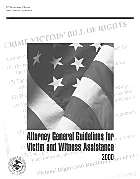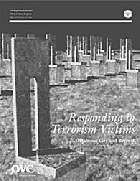![]() Chapter 1: Domestic and International
Leadership
Chapter 1: Domestic and International
Leadership
Objective: To provide leadership on effective responses to crime victims at the local, state, national, and international levels.
A central piece of the Office for Victims of Crime’s mission is to provide leadership in changing attitudes, policies, and practices to promote justice and healing for all victims of crime. OVC is the only federal agency in the United States established to address crime victim issues and is one of the few offices of its kind around the world. As such, OVC is in a unique position to gather victim-related information from a broad cross-section of sources, synthesize that information, and provide guidance and direction to practitioners in the field and the public.
 Memorial stone for victims of the 1988 bombing of Pan Am Flight 103 over Lockerbie, Scotland. Courtesy of "PA" News Photo Library. |
This chapter highlights some of the areas in which OVC has provided leadership to the field during FYs 1999 and 2000. The first half focuses on OVC’s domestic leadership activities through policy development, program development, and public awareness and outreach, while the second half focuses on OVC’s leadership efforts in responding to terrorism and international issues.
Leadership Through Policy Development
A major responsibility of OVC is to provide guidance and direction within the U.S. Department of Justice and to the field on how to implement laws and programs for crime victims. OVC accomplishes this by issuing guidelines and protocols, drafting and reviewing proposed legislation, disseminating information on cutting-edge issues affecting the victims field, convening focus groups to gather input on key issues affecting crime victims, and leading and serving on working groups. Discussions of some of these OVC activities follow.
VOCA Victim Compensation and Assistance Program Guidelines
One of OVC’s primary functions is to administer the Victims of Crime Act victim compensation and victim assistance grant programs (see chapter 2 for more information on these programs). Under this task, OVC provides states with guidance on how to administer and implement these programs. Through VOCA program guidelines, OVC provides leadership to the field based on legislative changes and emerging trends that affect how the programs are administered. During the 2-year period covered in this report, OVC developed new program guidelines that update those published in 1997.
VOCA Victim Compensation Program Guidelines. The new guidelines encourage state victim compensation programs to cover victims who may not have been previously covered, including victims who have been threatened with or escaped physical injury or death but have experienced the trauma of crime. This would allow victims of stalking, bank robbery, hate crime, and workplace violence and children who witness violence, among others, to be covered. The guidelines also encourage states to cover citizens who are victims of crime abroad. By identifying these potentially underserved victims, OVC hopes to challenge states to assess the comprehensiveness of their programs and provides needed background information for states seeking to expand the scope of their programs.
VOCA Victim Assistance Program Guidelines. Significant new moneys have been deposited into the Crime Victims Fund during the past several years. The new guidelines encourage use of VOCA funding to cover a host of additional expenses, new services, and victims not typically covered. For example, the guidelines encourage victims’ rights compliance by allowing use of VOCA funds to support programs that help victims whose rights under state constitutional amendments and victims’ rights laws have been violated.
Attorney General Guidelines for Victim and Witness Assistance

The Attorney
General Guidelines for Victim and Witness Assistance 2000 (January
2000) informs U.S. Department of Justice personnel on how to treat
crime victims and witnesses based on federal victims' rights laws
and Department policy.
|
Focus Groups and Symposia
OVC provides significant leadership by conducting focus groups and symposia on emerging victim issues or areas that have received little attention in the past and disseminating information on these topics to the field. In FYs 1999 and 2000, OVC conducted more than 30 focus groups and symposia on topics including restorative justice, human trafficking, crisis response, victims of gun violence, stalking, elderly victims, and intimate partner homicide. OVC invites experts to participate in focus groups, with the goal of developing policies, programs, and educational materials to be used by the field. Two OVC programs are discussed below.
Drug-Facilitated Sexual Assault Focus Group. Drug-facilitated sexual assault (DFSA), often called “date rape,” poses a growing and increasingly complex problem for the criminal justice system. While there are widespread anecdotal reports of DFSA, there has been little scientific corroboration of the nature and extent of the problem and no clear protocol to follow regarding the collection of toxicology specimens. The Hillary J. Farias and Samantha Reid Date-Rape Drug Prohibition Act of 2000 directed the U.S. Attorney General to develop protocols and training for law enforcement regarding DFSA. To help accomplish this, OVC held a multidisciplinary forum in June 2000 to develop sensitive, effective, and pragmatic protocols for DFSA cases. The report from the DFSA forum will be disseminated nationally to the criminal justice and victim assistance fields. Recommendations from the focus group have guided OVC’s efforts in developing training and technical assistance on this topic in a number of venues, including the Third National Symposium on Victims of Federal Crime (Federal Symposium) held in Washington, D.C., in January 2001, and the First National Sexual Assault Response Team Training Conference, held in San Antonio, Texas, in May 2001.
Meeting the Mental Health Needs of Crime Victims. In June 2000, OVC and the National Institute of Justice (NIJ) sponsored a symposium on the mental health needs of crime victims. Participants from the research, mental health, and victim assistance fields discussed seven papers that were commissioned specifically for the symposium on effective mental health and legal interventions with child and adult crime victims and the implications of these interventions. Participants also generated recommendations for additional research and policy implementation. The papers will be published in a special edition of the Journal of Traumatic Stress, which will be disseminated to mental health practitioners nationwide. Ideas from this symposium have also led a number of other OVC projects to provide training to the mental health community on victim issues (see chapter 3 for more information).
|
Working Groups
OVC participates in a number of intra- and interagency working groups on issues affecting crime victims. In this way, OVC honors victims’ voices and ensures that their interests are represented when developing various policies and programs within the federal criminal justice system and across the Federal Government. Three examples of OVC’s involvement in working groups are highlighted below.
Presidential Pardon Group. During FY 2000, OVC staff participated in a DOJ working group that developed regulations governing victim notification and comment on petitions for executive clemency in the federal system. The rule, which was published in the Federal Register in September 2000, requires the U.S. Attorney General to notify crime victims in appropriate cases when an offender convicted of a federal felony files a petition for executive clemency. DOJ will invite victims to submit comments in response to the petition if they wish to do so and will inform them of the President’s final decision on the clemency request.
Elder Abuse Working Group. OVC currently serves on an Elder Abuse Working Group, made up of representatives from the U.S. Administration on Aging, the U.S. Department of Housing and Urban Development, the U.S. Department of Transportation, the National Institute on Aging, AARP, the United Nations, the National Sheriffs’ Association, the National Hispanic Council on Aging, and the Oregon Department of Human Services. The goal of this working group is to address aspects of elder abuse, including prevention efforts and the needs of victims.
Improving the Criminal Justice System’s Response to Individuals With Mental Illness. OVC has joined several other DOJ agencies to support the Council of State Governments’ Eastern Regional Conference on improving the criminal justice system’s response to individuals with mental illness. In recent years, the criminal justice system has seen an influx of individuals with mental illness. The lack of sufficient state laws, guidelines, and training on this subject has frustrated criminal justice agencies, mental health professionals, and victims. This project is an effort to respond to these concerns. OVC’s goal in this initiative is to ensure victim-sensitive input into the working group process and resulting recommendations.
Leadership Through Program Development
An important OVC objective is to support the development and replication of promising practices to serve crime victims, with the goal of improving the quality of victim services nationwide. These practices are built on sound research, innovative technologies, and community-based partnerships. OVC awards grants, cooperative agreements, and contracts and enters into intra- and interagency agreements to support the development and delivery of training and technical assistance for those who interact with crime victims and the development and delivery of services to victims. Two promising practices OVC supported during the past biennium are discussed below.
 Responding to Child Victims and Witnesses: Innovative Practices that Work (October 2000) is the resource guide companion to the OVC Responding to Child Victims and Witnesses Video Series. |
The Children Exposed to Violence Initiative (CEVI) was launched by DOJ in 1998 in a concerted effort to reduce crime and protect our Nation’s children. CEVI challenges local, state, and federal law enforcement to intervene early in the lives of children who are exposed to violence and hold perpetrators of violence against children accountable. The initiative encourages criminal justice personnel to partner with families, communities, schools, social service agencies, child protective services, mental and physical health care providers, business and government leaders, and domestic violence advocates to break the cycle of violence by improving prevention, intervention, and accountability efforts. OVC— along with other DOJ divisions and federal agencies—was integrally involved in formulating this project and produced a number of products under the initiative, including a resource guide on innovative practices, a bulletin on children exposed to violence, a monograph on breaking the cycle of violence, and a five-part video series for the criminal justice system that addresses the magnitude of the problem and the resources available to deal with it.
|
OVC began developing the Victim Services 2000 (VS2000) concept in 1997. The goal of the 5-year VS2000 project is to improve the range, quality, and accessibility of services for all crime victims by supporting the development of integrated victim service systems in urban and rural settings to serve as models for other communities. OVC awarded VS2000 demonstration grants to two urban communities and two rural communities. One urban site, Denver, Colorado, and one rural site, Vermont, have been successful with the project. The other two sites have been discontinued but have provided important lessons about why programs fail to grow. The Denver VS2000 site, in its fifth and final year of funding from OVC, is focusing on continuing goal implementation, producing products describing Denver VS2000 initiatives, developing a training and technical assistance strategy, and transitioning to an ongoing operational structure. The Vermont VS2000 site is in its third year of funding and continues to strengthen local and state collaborative efforts to ensure education for victim service providers and allied professionals, access for underserved populations, increased public awareness of victim services, and support for survivors. OVC hopes that both VS2000 programs will inspire other communities to develop comprehensive, integrated services for crime victims.
Leadership Through Public Awareness and Outreach
OVC’s mission includes raising public awareness of crime victims’ rights, needs, and services by informing the public of victim issues and providing education and training to victim advocates and allied professionals who work with victims daily. This responsibility involves identifying and raising awareness about specific topics. For example, the CEVI initiative was a major interdepartmental undertaking to raise awareness about children who experience violence and witness it in their homes, streets, and schools. Other topic areas that OVC has highlighted in recent years include trafficking, terrorism, victims with disabilities, and immigrant victims. OVC also undertakes a number of public awareness activities each year during National Crime Victims’ Rights Week.
National Crime Victims’ Rights Week
Each year, Congress designates one week in April as National Crime Victims’ Rights Week to shed light on the plight of crime victims and acknowledge the work of victims and victim advocates in obtaining rights and services for all crime victims. Communities across the United States observe National Crime Victims’ Rights Week by hosting rallies, vigils, public education campaigns, and award ceremonies in support of victims and victims’ rights.
OVC organizes an annual ceremony on behalf of the President and the U.S. Attorney General to honor recipients of the National Crime Victim Service Award, the highest federal honor for victim advocacy (see chapter 6 for recent award recipients). OVC also funds the development of a National Crime Victims’ Rights Week Resource Guide to help communities plan and implement commemorative events that focus attention on victims’ rights, needs, and services. The guides are sent to more than 10,000 people in the field each year and include public education and community awareness materials, resources for the news media, statistical overviews on topics relevant to crime and victimization, and camera-ready artwork for posters, bookmarks, and other outreach materials.
Leadership in Responding to Terrorism, Mass Violence, and International Issues
During FYs 1999 and 2000, OVC concentrated on providing leadership for responding to incidents of terrorism and mass violence at home and in international arenas. Several terrorist incidents have occurred in recent years, highlighting the fact that terrorism against U.S. citizens, both at home and abroad, has become an ever-present threat for which the United States must be prepared. In 1995, the United States was shocked by the most devastating incident of domestic terrorism in our Nation’s history: the bombing of the Alfred P. Murrah Federal Building in Oklahoma City, Oklahoma. While no model was in place at the time to guide the field’s response to this terrible tragedy, the extraordinary efforts of individuals and agencies in the wake of the bombing have set a standard for others to follow in responding to terrorism. In October 2000, OVC released Responding to Terrorism Victims: Oklahoma City and Beyond, a report that describes victim assistance efforts following the Oklahoma City bombing and other crises, identifies critical rights and needs of victims, and makes recommendations for improving future responses. OVC has used lessons learned from the Oklahoma City response as a foundation for developing policies and programs and for providing victim-sensitive responses to recent international terrorist cases.
New legislation also has significantly expanded OVC’s authority to respond to victims of domestic or international terrorism and mass violence. The Victims of Trafficking and Violence Protection Act of 2000 authorized OVC’s director to create and maintain a compensation program specifically for victims of international terrorism. It also increased the amount of money that OVC can hold in its Emergency Fund and broadened OVC’s ability to use it to respond to international terrorism cases. OVC created a special unit within the office to respond to the new legislation and to handle these extremely sensitive and time-consuming cases. The following section describes some of OVC’s leadership initiatives for responding to incidents of terrorism and mass violence in the United States and internationally.
Initiatives To Address Domestic Terrorism and Mass Violence

Responding
to Terrorism Victims: Oklahoma City and Beyond (October 2000)
identifies special measures needed to protect the rights and meet
the needs of victims of large-scale terrorist attacks involving
mass casualties.
|
Community-Based Criminal Crisis Response Initiative (CCRI). For the past 3 years, OVC has supported the Jefferson Institute for Justice Studies (JIJS) to develop CCRI, which is a community-based assessment and planning process that helps local communities and states design and implement a strategic plan for responding to victims of criminal mass violence, such as the Oklahoma City bombing and the Columbine High School shooting. Thus far in the initiative, JIJS has identified communities that have existing plans, developed a community action plan and program implementation guide, and started working with communities nationwide to help them develop crisis response plans.
Mass Casualty Protocol for State Victim Compensation Programs. During the past 2 fiscal years, OVC worked closely with state administrators of victim compensation programs to help them develop a plan for responding quickly and effectively to incidents of mass violence in their states. OVC urged state administrators to educate law enforcement and emergency preparedness officials about the compensation resources available to assist victims of terrorism.
Mental Health Needs of Terrorism Victims. OVC provided funding to the Center for Mental Health Services, Emergency Services and Disaster Relief Branch, to review available materials and protocols that address the immediate and long-term mental health needs of victims of mass criminal disasters. The center is using OVC funding to develop training materials; deliver training and technical assistance; coordinate crisis response roles among local, state, and federal agencies and community service organizations; and develop partnerships between mental health and victim assistance disciplines. These efforts are directed principally toward law enforcement officers and emergency first responders who are tasked with assisting victims of terrorism and mass violence.
Columbine High School Shooting. In April 1999, students at Columbine High School in Littleton, Colorado, suffered the worst school shooting in our Nation’s history. To aid the victims and their families, OVC awarded funding to the Columbine community and the state to support victim services, including crisis and mental health counseling, and defray some of the out-of-pocket expenses incurred by victims.
|
Initiatives To Address International Terrorism and Other Crimes
Until recently, international acts of terrorism against the United States were considered relatively rare events, and no protocols or systemic responses were in place for responding to victims. However, recent terrorist attacks and other international crimes galvanized OVC to lead a federal effort to develop an improved and streamlined response to victims of international terrorism.
Federal Interagency Protocol for Responding to Victims of Terrorism Abroad. Many federal agencies, including the U.S. Departments of State, Justice, Defense, and Health and Human Services, the Agency for International Development, and others, play a role in responding to international terrorist acts that affect American nationals. To date, however, there has been no clear protocol regarding the responsibilities of each agency in responding to victims of such attacks. OVC is leading an interagency effort to develop guidelines for responding to victims of terrorist acts outside U.S. boundaries. OVC has produced a report on existing resources and the responsibilities of key federal agencies, identified a number of important issues for discussion, and is working with other agencies to draft a protocol for organizing short- and long-term responses to victims.
International Terrorism Victims Compensation Program. The Victims of Trafficking and Violence Protection Act of 2000 gave the OVC director the authority to create and maintain an International Terrorism Victims Compensation Program. This program will allow U.S. nationals and U.S. Government employees who become victims of terrorism abroad to apply to a single federal office to obtain compensation. Prior to this act, victims of the same crime each had to apply to separate state compensation programs (depending on where they lived), creating many logistical and equity difficulties. OVC is in the early stages of creating this program and will work with other federal agencies involved in U.S. efforts abroad to develop it.
|
Terrorism Emergency Fund. The Victims of Trafficking and Violence Protection Act of 2000 also gave OVC broader authority to use its Emergency Fund in international terrorism cases. Under this new authority, OVC can give grants to a wider range of organizations, including victim service organizations and U.S. Government and nongovernment agencies that serve victims, and can help victims not only with emergency relief, but also with ongoing assistance during the investigation and trial. OVC is currently formulating guidelines to implement this new authority.
Autopsy Information for Families of International Terrorism Victims. Autopsies, which are often essential to a criminal investigation, raise very difficult and painful issues for many families who have lost a loved one in a terrorist attack abroad. In the aftermath of the 1998 East Africa embassy bombings, the U.S. Attorney General identified a need to give families sensitive, accurate information at the time authorization is sought for an autopsy and as a reference for the future after the initial shock has abated. OVC worked with senior FBI agents and the Armed Forces Chief Medical Examiner to develop a brochure for victim families. FBI agents and victim specialists also will be trained on how to approach families about this delicate issue.
Fostering the Reunification of Internationally Abducted Children. OVC continues to support the International Division of the National Center for Missing and Exploited Children by making funding available to allow parents of internationally abducted children to retrieve their children from a foreign country and return with them to the United States. Under OVC’s reunification program, 26 children were reunited with their families in the United States in 2000.
|
Direct Services to Victims of International Terrorism
During the past biennium, OVC staff provided direct services to victims of federal crimes, particularly in international terrorism cases. Terrorism against Americans is not limited to the borders of the United States. Since 1998, terrorists have taken the lives of Americans in Kenya, Tanzania, Uganda, and Yemen, among other places. During this same period, the trial of two suspects accused of the 1988 bombing of Pan Am Flight 103 over Lockerbie, Scotland, became a major international effort. OVC was integrally involved in ensuring that victims’ needs were adequately addressed in each of these cases. OVC’s direct services to other federal victims are discussed in chapter 2.

Suse Lowenstein and Peter Tsairis,
and his wife Aphrodite Tsairis, being hugged by Peter Lowenstein,
after announcement of the verdict of the Pan Am 103 trial. The Lowensteins'
son Alexander (21) and the Tsairis' daughter Alexia (20) were both
victims. Courtesy of "PA" News Photo Library.
|
East Africa Embassy Bombings. Following the simultaneous bombings in 1998 of U.S. embassies in Kenya and Tanzania, OVC transferred funds to the U.S. Department of State to help with the emergency needs of victims and their families. OVC funded and helped organize a 2-day briefing for victims and their families in Washington, D.C. OVC staff helped troubleshoot problems victims were having coordinating benefits and assistance and used the OVC grantee and subgrantee network in the states to locate assistance for victims in their communities or home state of residence. OVC provided technical assistance to and continues to fund a victim/witness position in the U.S. Attorney’s Office for the Southern District of New York to act as a point of contact for family members and victims to receive trial information.
|
The Bombing of the U.S.S. Cole. OVC provided technical assistance and funding support to the FBI and the U.S. Department of the Navy in responding to the victims and family members of the October 2000 bombing of the U.S.S. Cole in the port of Yemen, which killed 17 sailors and injured 39 others. This support included the development of a Web site and a briefing book, a toll-free telephone number, and victim-sensitive correspondence. OVC also provided financial assistance for a facility, transportation, lodging, and per diem for victims’ families to attend a briefing in Norfolk, Virginia, the U.S.S. Cole’s home port.
|
International Outreach
Technology has made communication with other countries not only possible, but imperative, as crimes cross international borders and we become an increasingly global society. OVC has an interest in ensuring that American victims of transnational crimes such as terrorism, international child abduction, and trafficking receive the rights and services they need. At the same time, OVC wants to help other countries provide comprehensive rights and services to crime victims. During the past biennium, OVC staff traveled to Israel, Japan, Kenya, the Netherlands, and Scotland to help those countries develop their victims’ rights laws and programs and to learn from colleagues in those countries. OVC also hosted interns from Israel and Japan and held scores of in-office briefings for visitors from other countries. OVC staff presented information about OVC and victims’ rights laws at a number of international conferences, including an international crisis response seminar held in Tel Aviv, Israel, in January 2000 and the World Society for Victimology Conference in Montreal, Quebec, in August 2000.
Most recently, an OVC staff member served as a member of the U.S. delegation to the 10th Session of the U.N. Commission on Crime Prevention and Criminal Justice in Vienna, Austria, in May 2001. The U.N. Commission formulates international policies and recommends crime control activities. Delegates participated in working groups and meetings on trafficking, cybercrime, corruption, and victim issues.
| Previous |
|
|
|
| Office for Victims of Crime Report to the Nation 2001: Fiscal Years 1999 and 2000 |
December 2001
|
